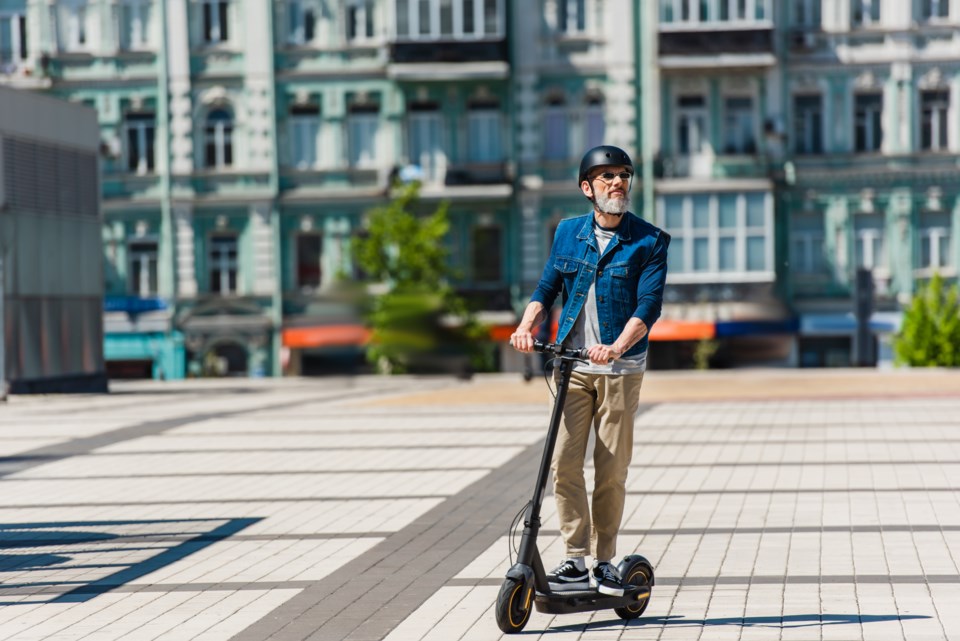There is no doubt that the eco-friendly e-scooter is convenient and fun and may revolutionize the way thousands of people travel.
Are e-scooters legal to ride in Ontario?
The Ontario government is in the middle of a 5-year pilot program aimed at rolling out e-scooters as a legal form of transportation. Similar to bike-share services, e-scooter rideshare programs would let subscribers rent an e-scooter for a short period of time. The province is asking municipalities if they choose to determine where e-scooters should be allowed and to develop rules around their use.
E-Scooter Pilot Project in Region of Waterloo
Starting on Canada Day in the Region of Waterloo, e-scooters will be allowed on multi-use trails, shared bike lanes and on roads with speed limits of 50 km/h or less. In a survey conducted in the spring of 2020, two-thirds of respondents were in favour of e-scooters on trails and city streets. Taking to the trails right now is illegal. Staff will monitor travel patterns, parking behaviors, accidents, and injuries in connection with the electric scooters.
Many municipalities are wary of legalizing e-scooters on public streets and paths. The City of Toronto opted-out of the pilot project based on unresolved insurance issues, accessibility barriers, and concern over general safety hazards that e-scooters might create.
Risks of riding an e-scooter
Electric scooters may be compact and a cheap way of travelling, but they’re also controversial. Many cities have banned the battery-powered scooters for safety reasons.
An e-scooter rider is vulnerable riding alongside passenger vehicles on city streets.
Injuries are common in collisions with vehicles, bicycles, objects, and pedestrians. A study by the journal of the American Medical Association found a 600% increase in emergency room visits due to e-scooter accidents over a 5-year period. One -third of those injuries involved head trauma. E-scooters can travel up to a speed of 24km/h and depending on the community, adults may not be required to wear a helmet.
Questions of liability and the right to sue
E-scooter rideshare services require users to agree to its terms and conditions of use. The two largest e-scooter rideshare companies in the U.S. require users to relieve them of liability in the event of an accident which injures another person. This helps them, but leaves the driver exposed.
E-scooter riders agree to take responsibility for damage they cause to other people or property. Without third-party liability insurance included in the rideshare company’s terms of service, e-scooter riders may be responsible for paying large financial settlements if the device they are operating injures another person.
Permission to unlock and e-scooter is granted only when a rider accepts the terms of the User Agreement which waive the company’s liability in case of an accident. If injuries do occur, riders may not have many options based on the insurance policies and terms of the user agreements.
Injured in an e-scooter accident
E-scooter riders are particularly vulnerable to collisions with other motor vehicles while only wearing a helmet for protection. If you are operating an e-scooter and you are injured in an accident with a motor vehicle, you have the right to claim accident benefits in the same way as pedestrians and cyclists. You may also have the right to sue the at-fault driver.
Injured by an at-fault electric scooter rider
Insurance coverage becomes much more complicated if you suffered an injury because of the negligence of an e-scooter rider.
Currently, e-scooter riders are not required to purchase insurance under the Ontario no-fault system and unfortunately, the e-scooter operator’s automobile insurance policy would not apply. In places where e-scooter riding is banned, there may not be insurance coverage to protect the operator and the victim of an injury.
So, what happens if you hit and injure somebody while riding an e-scooter? Auto insurance policy third-party liability coverage would not apply to incidents involving the operation of an e-scooter. Consequently, the rider may be personally liable for personal injury and property damages.
Typically, homeowner’s policies contain provisions which would protect an e-scooter operator in this circumstance. However, one would have to read the provisions of the relevant homeowner’s policy to be sure. If the rider does not have property insurance, they may not be covered for these types of liability claims. In places where e-scooter riding is banned, there may not be insurance coverage to protect the operator and the victim of an injury.
The personal injury lawyers at Dietrich Law Office in Kitchener do have some concerns about safety and insurance coverage.
“While Dietrich Law Office encourages this pilot project, for the health of everyone, not just the riders, we strongly urge the Provincial Government and the Legislature to examine safety issues while balancing the insurance needs of all those present on our roadways. The current system, while privately managed, is mandatory on auto owners and the premiums are only intended to compensate for damage and provide treatment and rehabilitation not available through OHIP. It would not be wise to leave out such a large group, or to leave them at risk.”
Currently, municipalities, e-scooter companies and riders are searching for a place on Ontario’s roadways, paths, and trails. The provincial e-scooter pilot program will be evaluated in the fall of 2024 and a decision will be made on their future.
If you have questions about a personal injury liability issue, contact the lawyers at Dietrich Law Office at (877) 534-9494 or visit them online here.
